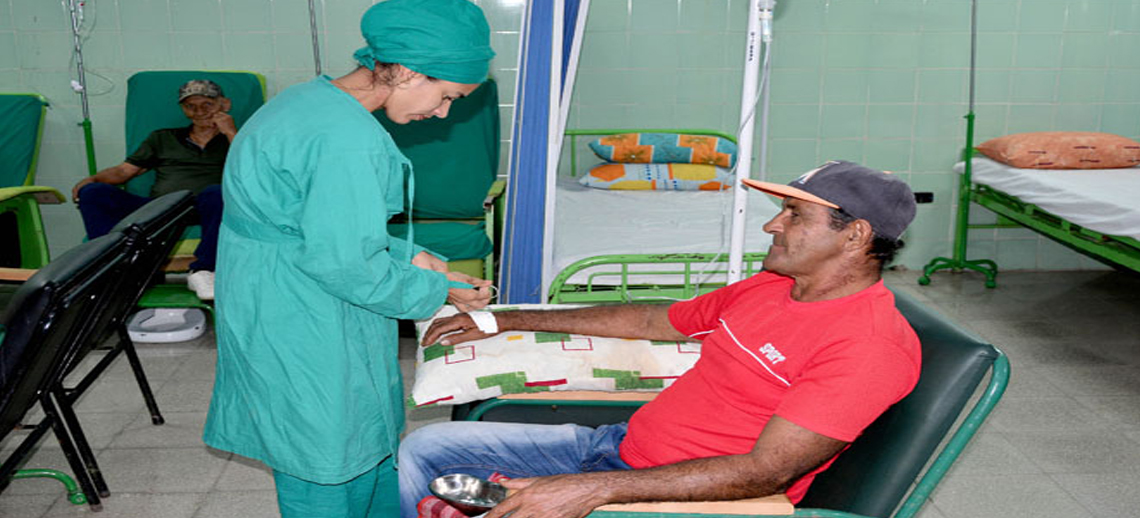The damages caused to Health by the economic blockade imposed on Cuba by the United States are unquestionable, since the beginning of its implementation it has been prioritized point of the aggressions of the American governments.
But this sector has remained unvaried among the priorities of the Revolution, both in the 1976 Constitution and in the current one, which in its article 72 establishes Public Health as “a right of all people” and lays down the responsibility of the State to guarantee “Access, gratuity and quality of care, protection and recovery services”.
In the province of Granma, restrictions are also important derived to the embargo to which the country has been subjected for more than five decades, as Dr. Dumar Rosales Fernández, specialist in Plastic Surgery and Caumatology, and head of the hospital´s department at the provincial health office, expressed.
“The limitation of resources and medical supplies that we have today to provide a higher quality service to our patients is important,” he says, “and it is related not only to medical equipment, but also to anesthesia machines, ventilation equipment, medications for the cancer treatment, essential antibiotics for the recovery of the post-surgical patient, emergency processes that we evaluate daily, and cardiovascular patient, not only for heart attack, but for other infectious processes associated with this entity.
“For example, in the Nephrology Program in the Carlos Manuel de Céspedes Provincial Hospital, of Bayamo, only 13 artificial kidneys are working of 20, the others do not do it due to deficit of parts with North American components and do not enter the country, this affects the increase in dialysis shifts ”, he said.
Dr. Dumar explains that in the province there are six provincial and four rural hospitals and the impact of the blockade on the sector are more visible in prioritized programs such as: Cardiology, Nephrology, Orthopedics, Cancer, Maternal and Childhood (PAMI), Intensive and Neonatal Therapy and Surgical activity.
In the past months, although 58,286 surgeries have been performed, the shortages of the medical supplies and essential expendable material such as sutures, surgical gloves, syringes, disinfectant solutions, etc. has faced.
The Nephrology Program, of high human sensitivity, has a deficit of parts for the repair of artificial kidneys, instability with antibiotics and solutions. In total, 274 patients undergo hemodialysis in the province and only 41 kidneys work.
Likewise, the damages reach the Hip Fracture Program, with the lack of plaster, screws and sheets, hip and knee prostheses; In Cancer, the impact is showed in the instability of medicines used in the different oncological treatments such as chemotherapy, the acquisition of new technologies, laparoscopic, mammography, microscopes, tissue processors, X-rays and ultrasound.
While in the PAMI they are related to the non-acquisition of incubators for neonates, ventilation equipment, nasogastric probes, serum equipment, high resolution ultrasound for the Genetics program.
Dumar Rosales asserts that even so “the service has not been stopped, no one intensive therapy has been closed. Our hospitals continue working to ensure something as important as human health and life¨.
“Before this blockade there is a disposition and a will not only of the sector, but of the Government and of the Party, and as one of the conquests of the Revolution, every effort is made so as to minimize the damages, and to keep that standard that represents the sector worldwide high¨.
“In this last aspect, the enemy is working to discredit the Cuban Health System and we have the duty, to constitute one of the main ideas defended by the historic leader of the Revolution, Fidel Castro, to continue flying that flag in Cuba and in any site of the world¨.
http://lademajagua.cu/la-salud-una-prioridad-de-la-revolucion-con-o-sin-bloqueo-audio/

